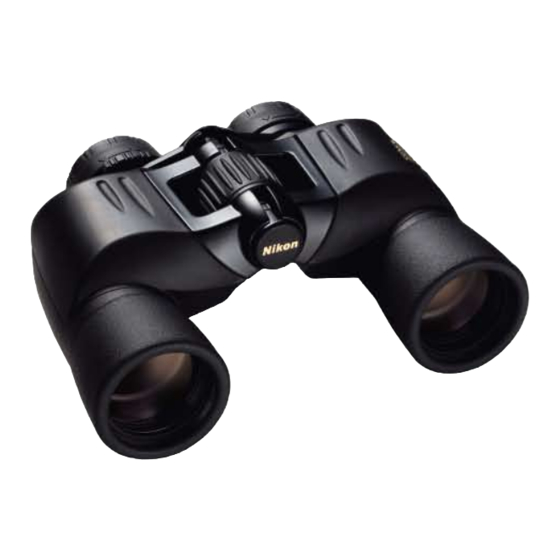Nikon MONARCH X 8.5x45DCF Brochure - Pagina 6
Blader online of download pdf Brochure voor {categorie_naam} Nikon MONARCH X 8.5x45DCF. Nikon MONARCH X 8.5x45DCF 25 pagina's. Sport optics

High Grade
When only the best will do
Topping off Nikon's broad lineup of widely acclaimed binoculars, the six HG L series models are
designed for unparallelled performance and comfort. Exacting lens and prism construction ensures
sharper, brighter images to intensify your viewing experience. Other aspects, such as the finely tuned
mechanics and optical design, work together to reveal subtle details you'd have otherwise missed.
for bright, high-contrast images
• Nikon's original multilayer coating
Minimises flare and ghosts, for very high transmission across a wide range of
wavelengths. The result: excellent contrast and colour reproduction.
• Phase correction coating
Corrects phase shifts caused when light reflects off the roof (Dach) prism.
Provides a high-contrast image by eliminating the reduction of resolution.
• High-reflection silver coating
Much greater reflectivity and much less light loss from the prism, compared with
ordinary aluminium coating, for brighter images.
for sharp, undistorted images
• Field flattener lens
Employed for eyepiece lens. Provides images that are sharp and clear all the way
to the lens periphery.
• Distortion correction
Nikon's superb optical design provides high-level distortion correction enabling
sharp, undistorted images even at the viewing area periphery.
easy to use
• High-eyepoint design
Sophisticated design technology achieves a combination of high eyepoint and
small size.
• Soft-touch silicon rubber eyecup
• Made with environment-friendly materials
• Turn-and-slide rubber eyecups with multi-click*
Non-PVC (polyvinyl chloride) materials are used for
facilitate easy positioning of eyes at the correct
the body, eyepiece lens cap, objective lens caps, case
eyepoint
and wide strap; Eco-glass optics free of lead and
• Large focusing ring makes for easier operation
arsenic are used for all lenses and prisms
• Every model is waterproof up to 2m/6.6 ft. (3m/9.8 ft.
• Can be fixed to a tripod using optional tripod adaptor*
for 8x20HG L DCF/10x25HG L DCF) for 5 minutes and
(see p 44)
*Except 8x20HG L DCF/10x25HG L DCF.
fog-free, with O-ring seals and nitrogen gas
%T
100
Light transmission rates
90
80
Generally speaking, the higher the light transmission
70
rate of a lens, the brighter and clearer your image will
60
be, with less blur and ghosts. Each of Nikon's high-
50
40
grade binocular models features a high light
30
A Nikon conventional product
transmission rate thanks to our multilayer-coated lenses
20
Source: Nikon (actual value)
10
and prisms.
420
500
600
700 nm
10
8x42Hg L DCf/10x42Hg L DCf
Supreme optical performance
• Lightweight (8x: 795g, 10x: 790g)
• Sturdy, lightweight die-cast magnesium alloy body
• Close focusing distance of 3m
• Dioptre adjustment ring locking system prevents unintentional
rotation
• Excellent performance at temperatures as low as –20°C
• Rubber armouring for shock resistance and a firm, comfortable grip
• Ergonomic design for greater ease of holding
• Eyepiece lens caps are connected for easy use
© Maurizio Bachis
8x32Hg L DCf/10x32Hg L DCf
advanced optical performance in a smaller size
• Finely balanced compensation of aberrations
• Close focusing distance of 2.5m
• Dioptre adjustment ring locking system p revents unintentional rotation
• E xcellent performance at temperatures as low as –20°C
• R ubber armouring for shock resistance and a firm, comfortable grip
• Ergonomic design for greater ease of holding
• Eyepiece lens caps are connected for easy use
8x20Hg L DCf/10x25Hg L DCf
The ultimate in compact performance
• Sturdy, lightweight die-cast magnesium alloy body
• Foldable design is convenient for carrying
8x32HG L DCF
• Close focusing distance of 2.4m (8x) and 3.2m (10x)
• Dioptre adjustment ring is located in the centre of the body, which
improves operability
• Excellent performance at temperatures as low as –30°C
11
8x42HG L DCF
8x32HG L DCF
8x20HG L DCF
* For specifications, see pp 38-39.
